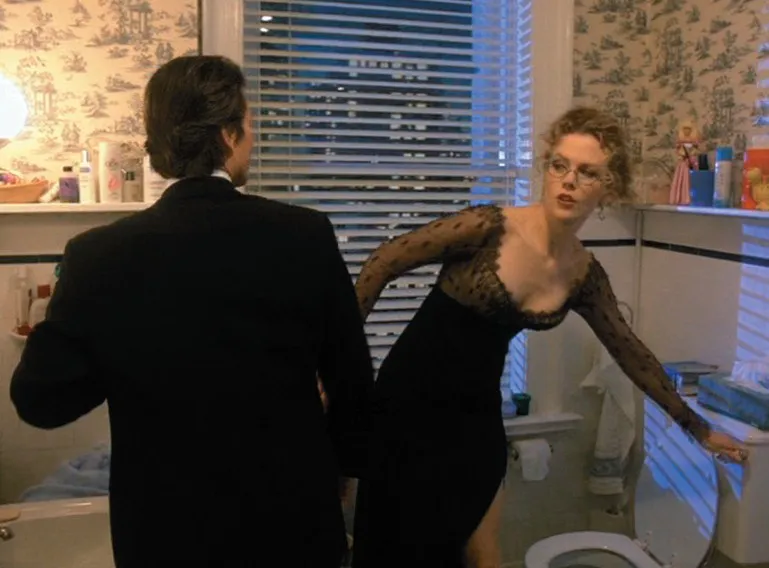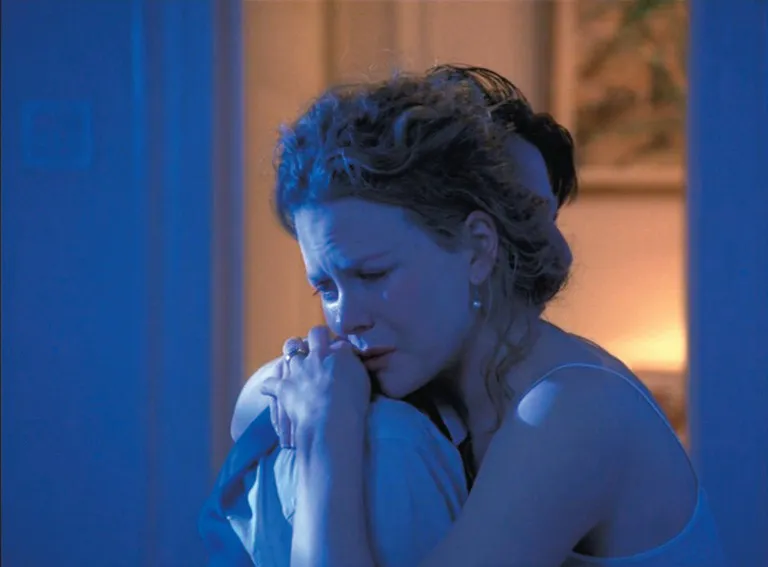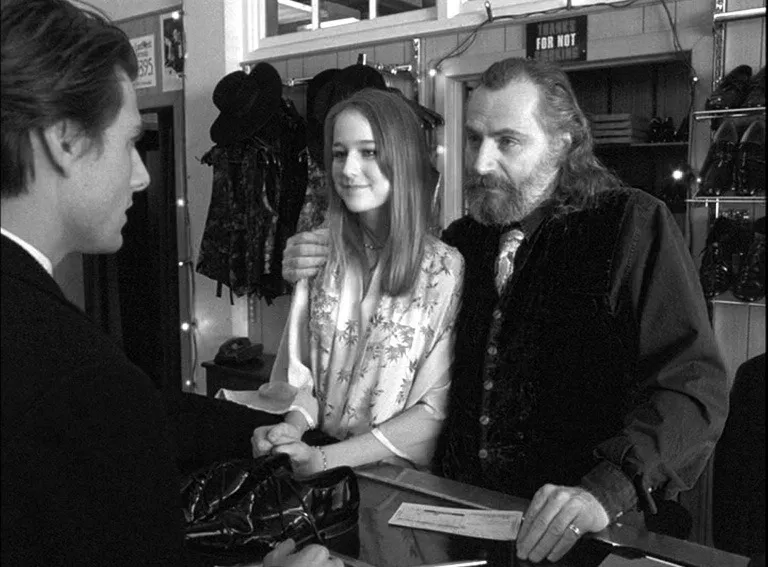![]()
Eyes Wide Shut
1. ‘You’re not even looking at it’
‘You’re not even looking at it,’ says Alice to Bill. She has just asked if her hair looks all right and her husband has replied, ‘It’s great,’ without looking at it. They are about to go out to a very smart party and she has done her hair in a magnificent cascade of curls.
But, at the point when she asks him, ‘Is my hair OK?’ she is just getting up from the toilet seat, where she has been sitting to urinate, wiping herself discreetly afterwards beneath her lifted dress and – it’s true – whether out of indifference or a certain sense of decency, he hasn’t looked at her.
‘You’re not even looking at it’ could also be a warning addressed to the film’s audience, and more still to the critic thinking of writing about the film. Although video and DVD enable him to keep all its images at home and see everything as often as he likes, he may still very easily fail to look in the right place at the right time.
After all this film is called Eyes Wide Shut and, just before the title appears on screen, we have seen Alice from behind, in a room, taking off an evening dress to appear naked. The image lasted no more than a few seconds, between two cuts. So viewers who have come with the intention of seeing and keeping their eyes wide open have briefly admired Nicole Kidman; they may well have said to themselves that, if they were Bill Harford, Alice’s husband, they would not have missed the chance to look at her.
ALICE: You’re not even looking at it
The following evening Alice remembers the naval officer for whom she would have abandoned everything and identifies what triggered her desire: ‘He glanced at me.’
In another scene from the film, during an erotic masked ball, another woman, completely naked but seen from the front – only her face is hidden by a mask – comes into a library with a man dressed in a cape and a Venetian mask. The next shot shows the same man from the same angle and in the same room, with the woman beside him, but both are shown at a little more distance. The woman goes up to Bill, who is also wearing a mask, and asks him to go with her to a more private place. For the cinema audience, this has to be the same woman.
Yet, if we watch the film again at home, we discover something rather strange: there is not one woman but two; or rather, the first woman is replaced by another from one shot to the next. They both wear the same mask and are with the same man (hence the confusion), but they do not have the same breasts (the second woman’s are heavier) or the same pubic hair (the first woman’s is more shaved). In the normal run of things every member of the audience might be expected to notice this; but to do so, they would all have to take a good look at the taboo body parts on display before their eyes, they would have to compare breasts and pubic hair. Perhaps the spectators are ashamed to look at what is shown to them; they don’t always dare to really see what they’re watching: ‘You’re not even looking at it.’
‘The man in the unicorn mask enters the room accompanied by a naked young woman’
YOUNG WOMAN: Have you been enjoying yourself?
My aim here is to try to see what should be seen and to hear what should be heard; yet perhaps, inevitably, like the policemen in Edgar Allan Poe’s story ‘The Purloined Letter’, who go to the place where the letter has been hidden but do not notice it lying there before their eyes, we shall neither see nor hear anything.
Or perhaps the film would say that both seeing and hearing are an illusion.
2. ‘Do you feel like playing?’
Eyes Wide Shut is Kubrick’s last and, in my view, one of his three greatest films, alongside 2001: A Space Odyssey (1968) and Barry Lyndon (1975). It’s the story of a young doctor and his wife, Bill and Alice Harford, who live in Manhattan and have a daughter of about six or seven called Helena. One evening, during a pre-Christmas party given by the millionaire Ziegler, each has the chance to be unfaithful to the other, she with an attractive man of around fifty, he with two models; but nothing happens. The following evening they discuss the party and talk about how men and women experience jealousy. Probably to make her over-confident husband jealous, Alice tells him that she once almost left both him and their daughter for a naval officer. Bill seems devastated. Their conversation is interrupted when Bill is called out because one of his patients has died. That night, while walking in south Manhattan, obsessed by the image of his wife giving herself to a stranger, he has further opportunities to be unfaithful to her: with the dead man’s daughter, Marion, who tells him she loves him (but they are interrupted by her fiancé Carl); with a prostitute, Domino, who takes him home with her (but his wife calls him on his mobile phone and he decides to leave); lastly when, his identity concealed by a mask and cape, he goes to a secret meeting of the very rich. This is a ritualised orgy whose password he has been given by Nick Nightingale, a former fellow student turned jazz pianist. To find a costume to rent at such a late hour, Bill has had to wake Milich, a most peculiar individual. While serving Bill, Milich catches his daughter of about fifteen in her underwear with two Japanese gentlemen, whom he locks up in his shop. This girl also gives Bill an inviting glance.
In the grand mansion outside New York, where the orgy is taking place, Bill is soon identified as not belonging to that world, although, like everyone else, he is wearing a mask. One of the women from the orgy begs him to leave, saying, ‘It could cost me my life and possibly yours’. When Bill appears before the assembled participants, it seems he may be about to suffer an unpleasant fate; however the same woman makes a theatrical offer to redeem him by suffering we know not what punishment in his stead. He has to leave, without knowing what is going to happen to the woman.
On returning home, Bill finds Alice laughing in her sleep. She is having a nightmare, which she describes to him when she wakes up. In this dream Alice was taking part in an orgy and laughing at her husband, who was also present. Bill tells her nothing of his own night’s experiences.
The following day Bill tries to get back to his interrupted adventures of the previous night. However it is Carl rather than Marion who answers the phone. Domino, with whom he almost had sex, is not at home; she has discovered that she is HIV-positive. When Bill returns in daylight to the mansion where the orgy took place, he is handed a letter warning him to abandon his enquiries. Afterwards, when he takes his costume back to the shop (all except the mask, which he has lost), Milich’s behaviour has changed completely; he very clearly gives Bill to understand that he is offering him his ‘daughter’’s sexual services.
Ziegler’s party: a ‘curtain of light’
Alice recounts her dream: ‘hundreds of men, everywhere’
MILICH: Anything again – anything at all
Bill also learns that Nightingale has been abducted from his hotel by two men, who may also have beaten him up, and has left the city. Then he discovers that a former beauty queen named Amanda Curran, possibly the woman who offered herself as a victim in order to save him, has suffered an overdose. She has died and he goes to see her at the morgue. Is this the woman whose bad reaction to drugs he previously treated during the party hosted by Ziegler (who was sleeping with her)? Bill receives a call from Ziegler, who wants to talk to him.
At Ziegler’s there is a long discussion: the millionaire says that he was present at the orgy, that he saw everything, that the house was full of very important people and that Bill should not get involved. He also tells him, but not immediately, that Amanda’s sacrifice was staged to get rid of Bill, and that she was not killed; according to Ziegler it was her own fault that she died of an overdose; it was because of the life she was living and had nothing to do with the orgy. Bill’s belief that she had been murdered was just his imagination running away with him.
Bill goes home, once again at night. His wife is sleeping in the marital bed and, next to her on the pillow, in her husband’s place, lies the mask that he was wearing during the orgy. Bill cracks: ‘I’ll tell you everything,’ he sobs. This is followed by an ellipsis. Later, in the small hours, we see them crying together. Life returns to normal and husband and wife are talking in a toy shop decorated for Christmas, where they have gone to buy presents with their daughter. Alice tells her repentant husband that they should be grateful that they have survived all their ‘adventures’, real or dreamed, that she loves him, that they are both now ‘awake’ – ‘hopefully for a long time to come’, and that the one thing they must do as soon as possible is ‘fuck’. Cut to the final credits.
The above is a brief résumé, with no attempts at interpretation or understanding the characters ‘from within’, of the strange story Kubrick chose to tell in what was sadly to be his last film. It is a story set in the present day, but taken from a short story written in German in 1925 by the Viennese author Arthur Schnitzler. Kubrick had long wanted to adapt this story and remains extraordinarily faithful to its narrative thread.
Schnitzler has often been described as a ‘Freudian’ writer because of the presence of dreams in his work, not to mention the fact that both he and the inventor of psychoanalysis lived in the same city at the same time. There is even a famous letter of Freud’s, dated 14 May 1922, in which he praises Schnitzler, saying that the reason he has never been to see him is that he is afraid of meeting ‘his double’.
Schnitzler spent a long time thinking about his Traumnovelle (‘Dream Story’).1 He wrote it when he was sixty-three years old, which was also Kubrick’s age when he began work on the film. It is an extraordinarily rich piece of writing, a real challenge for any film-maker, partly because of the images of the orgy, but also because what does not happen is much more important than what does.
So what is this story about? Why was Kubrick drawn to it?
Stanley Kubrick’s annotated copy of Schnitzler’s story (Stanley Kubrick: A Life in Pictures, produced and directed by Jan Harlan, © 2001 Warner Bros.)
3. ‘It’s only a dream’
Twenty-four dark slaves were rowing the magnificent galley that was to carry Prince Amgiad to the Caliph’...








